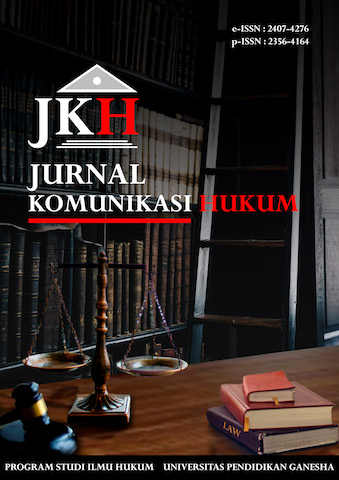PENGAKUAN DAN PERLINDUNGAN HUKUM TERHADAP HAK-HAK TRADISIONAL MASYARAKAT HUKUM ADAT DAYAK MA’ANYAN DI KECAMATAN AWANG KABUPATEN BARITO TIMUR
DOI:
https://doi.org/10.23887/jkh.v8i2.47087Abstract
The purpose of this research is to study and analyze The Traditional Rights of the Ma’anyan Dayak Indigenous Society in Awang Sub Regency East Barito Regency which has not yet acquired recognition and protection and Analyzing The Legal Recognition and Protection of the Ma’anyan Dayak Indigenous Law Society when there is an event of legal actions occurs. This Research is Empirical Research which obtained through legal identification (Oral) in form of habits that are still valid in the Ma’ayan Dayak Indigenous Society unit in Awang Sub Regency East Barito Regency which is then analyzed using an objective and relevant theory about The Traditional Rights Indigenous Law Society, therefore accurate results can be discovered about types of rights analyze The Traditional Rights of the Ma’anyan Dayak Indigenous Society in Awang Sub Regency East Barito Regency which must be given recognition and protection. This Research concludes that The Traditional Rights of the Ma’anyan Dayak Indigenous Society in Awang Sub Regency have not been protected since the regional government of east barito regency until now has not implemented and follow up The Minister of Affairs Regulation Number 52 of 2014 and from the Decree the Governor of Central Kalimantan Number 188.44/360/2020 about establishment the Central Kalimantan Province. Legally, there has been legal recognition of the indigenous law society and traditional rights attached to The Traditional Rights of the Ma’anyan Dayak Indigenous Society in Awang Sub Regency, which is Article 18 B paragraph (1) of the 1945 Constitution, however, there has not been further regulated in form of legislation and the desired legal recognition is not just de jure, limited to limited verbal legal recognition which coming first from the indigenous society itself and the surrounding society, but demand on embodiment in the true sense. Therefore when there is an event of legal actions occurring over The Traditional Rights of the Ma’anyan Dayak Indigenous Society prefers to resolve legal actions outside the court with their mechanism to resolve legal actions that occur in their territory according to the customary law through deliberation and consensus. Therefore, the Regional Government of East Barito Regency is expected to form a regional regulation as legal protection for protecting the rights of indigenous society in the various development process, the rights of indigenous society are not ignored.
Downloads
Published
How to Cite
Issue
Section
License
Authors who publish with this journal agree to the following terms:- Authors retain copyright and grant the journal right of first publication with the work simultaneously licensed under a Creative Commons Attribution License that allows others to share the work with an acknowledgement of the work's authorship and initial publication in this journal.
- Authors are able to enter into separate, additional contractual arrangements for the non-exclusive distribution of the journal's published version of the work (e.g., post it to an institutional repository or publish it in a book), with an acknowledgement of its initial publication in this journal.
- Authors are permitted and encouraged to post their work online (e.g., in institutional repositories or on their website) prior to and during the submission process, as it can lead to productive exchanges, as well as earlier and greater citation of published work (See The Effect of Open Access).
Authors who publish with this journal agree to the following terms:
- Authors retain copyright and grant the journal right of first publication, with the work [SPECIFY PERIOD OF TIME] after publication simultaneously licensed under aCreative Commons Attribution License that allows others to share the work with an acknowledgement of the work's authorship and initial publication in this journal.
- Authors are able to enter into separate, additional contractual arrangements for the non-exclusive distribution of the journal's published version of the work (e.g., post it to an institutional repository or publish it in a book), with an acknowledgement of its initial publication in this journal.
- Authors are permitted and encouraged to post their work online (e.g., in institutional repositories or on their website) prior to and during the submission process, as it can lead to productive exchanges, as well as earlier and greater citation of published work (See The Effect of Open Access).












